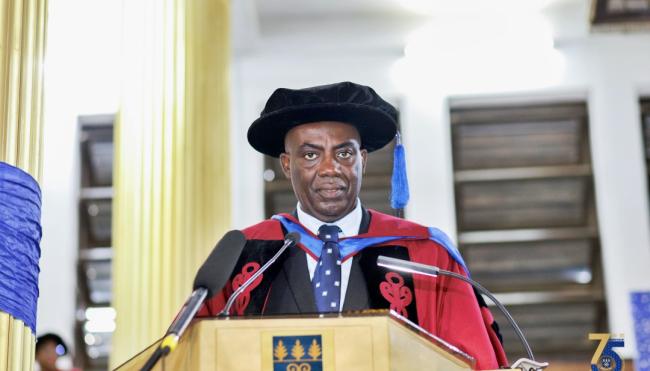Prof. Torpey Calls for Aggressive Action to End AIDS in Africa

Prof. Kwasi Torpey, a renowned professor of family health and Dean of the School of Public Health, has passionately advocated for a determined and aggressive approach to drastically reduce new HIV infections as a pivotal step toward ending the HIV/AIDS epidemic in Africa.
The Professor of family health, who has over 26 years of experience as a physician, scientist, researcher, and trainer, made the call when he delivered his inaugural lecture on the topic, “Ending HIV/AIDS in Africa: Reflections from the Clinic, Field, and Classroom,” at the Great Hall of the University of Ghana.
While relying on a number of his scholarly articles, which have been featured in high-impact journals and contributed significantly to the field of HIV/AIDS, he argued that ending AIDS in Africa is feasible, but there is a need to reduce the new infections.
“It is feasible to end AIDS in Africa, but there is the need to aggressively cut down the new infections through a combination of prevention strategies, identifying and improving access for treatment and removing all structural barriers that limit access to strengthening community and health systems in order to respond to evolving needs of the pandemic,” Prof. Torpey remarked.
He mentioned that “several countries in Africa have shown that ending HIV is possible. Achieving epidemic control requires a systematic reduction of new infections in the African region. We must lift up our game in prevention, care, and treatment efforts on the continent.” He commended African countries that have made major strides in ending AIDS, including Ghana.
Prof. Torpey also highlighted that a “strong HIV programme can only do well in a strong health system and the building blocks of the system include leadership and governance, health financing, health workforce, and service delivery among others”
Regarding vaccine development to reduce HIV infections worldwide, Prof. Torpey expressed optimism about the release of an HIV vaccine in the shortest possible time. “The rapid development of COVID-19 vaccines by Pfizer and Moderna using the mRNA technology has given HIV vaccine development a renewed hope.” Prof. Torpey commented.
Prof. Torpey emphasised the need to improve the care and treatment efforts of HIV/AIDS on the continent by focusing attention on HIV testing to identify those who are newly infected since they transmit the infection rapidly. “We must innovate, demonstrate creativity and commitment in this effort. Together, we can end AIDS in our lifetime”, he said.
Throughout his lecture, Prof. Torpey shared important insights on HIV treatments in Africa, highlighting the vertical transmission, sources of new infections in children, HIV and modern health systems and whether HIV/AIDS can ever end in Africa.
In her remarks as Chairperson, the Vice-Chancellor, Prof. Nana Aba Appiah Amfo, lauded Prof. Kwasi Torpey for sharing in-depth knowledge on the treatment of HIV. She encouraged him to attain greater heights, saying, “I’m very confident that you’d continue to play a significant role in getting us to the destination we desire”.
Earlier in an introductory statement, the Registrar, Mrs. Emelia Agyei-Mensah, welcomed all gathered to the lecture. She explained that “the delivery of inaugural lectures is a tradition in the University as well as a sign and testament of the strength of the academics and their units in the University.”
The lecture was attended by representatives of the World Health Organisation, Ministry of Health, UNAIDS, Population Council, FHI360, USAID and US Centres for Disease Control.
Some dignitaries present include Prof. C.N.B. Tagoe, former Vice-Chancellor; Emerita Professor Isabella A. Quakyi and Prof. Fred Binka, former Deans of the School of Public Health. Prof. Justice Olivia Anku- Tsede, former Legal Counsel and now Justice of the Appeals Court; Mrs. Elsie Addo Awadzi, Second Deputy Governor, Bank of Ghana; and Dr. Patrick Kuma-Aboagye, Director General of the Ghana Health Service, also attended the lecture.
There were several presentations made to Prof. Kwasi Torpey to congratulate him.
Prior to Prof. Torpey’s inaugural lecture, a week-long exhibition of his works was held at the Balme Library. The exhibition centered on his research in the following areas: HIV, TB, hepatitis, non-communicable diseases, reproductive health, and health systems.